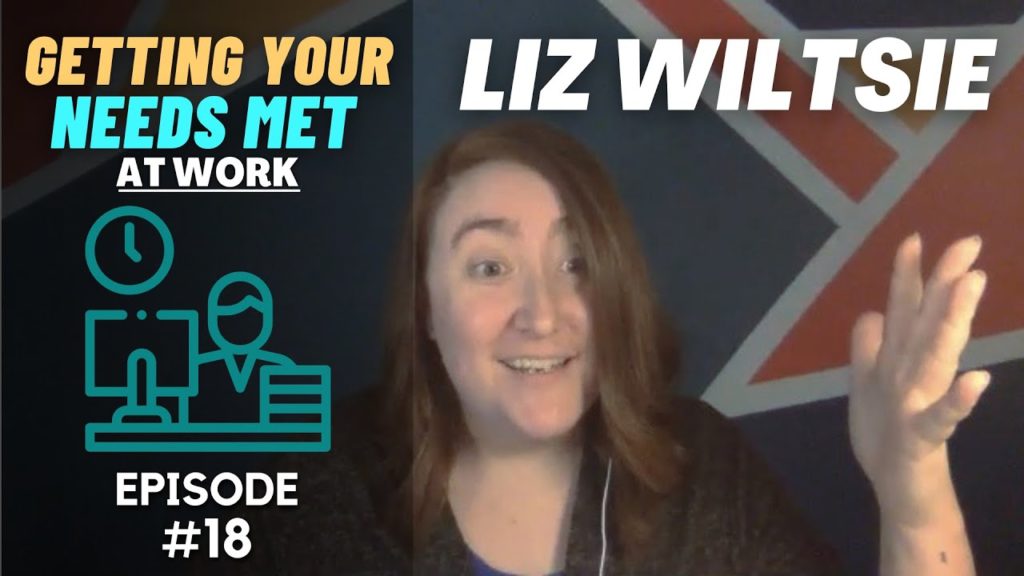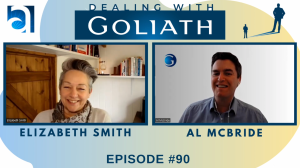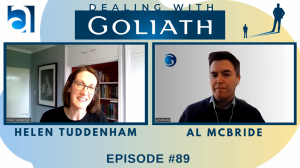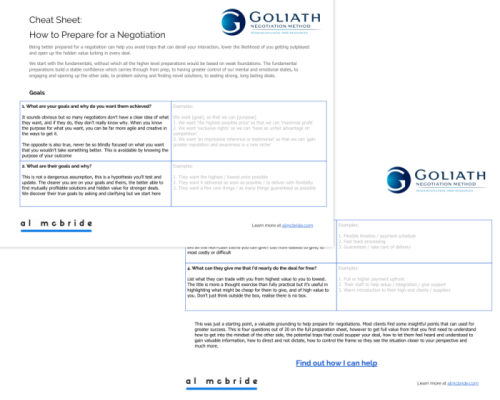Show Notes:
Liz Wiltsie is a trauma-informed leadership specialist based out of Los Angeles. She’s on a mission to support people in getting their needs met at work and organizations who genuinely want to put their people first. To that end, she created an interactive Field Guide to Naming Your Needs at Work and hosts the podcast, What’s Leadership?
On a personal note, I’ve been blessed to know Liz for over a year now and her clarity of thought and attention to detail is always invaluable and it always comes from a place of great fun, usually laughter and a lot of humanity.
Liz works with people who love their work but still suffers from burnout, resentment and communication issues.
- The way most deal with these issues is unfortunate and highly ineffective
- Before quarantine: Just 15% of global workforces are engaged at work
- The surprising cost of replacing a staff member
- Not the driver, but make people happier at work and you’ll make more money
- The 2×2 model based on 2 key questions which clarifies what workplace you’re in
- Robots, divas, martyrs and humans: how they interact
- The 4 essential buckets of needs for people to do their best work
Transcript
Al McBride 0:03
Welcome to the dealing with Goliath podcast. The mission of dealing with Goliath is to sharpen the psychological edge in business leaders with skin in the game, who want to be more effective under pressure, uncover hidden value and increase profitability.
Al McBride 0:15
With expert guests across the business spectrum. We deliver gems of wisdom delving into their methods, their thinking and approach to business life, and problem solving. This is the double espresso shot of insight through our short interview format, where we are as quick and concise as can be with five questions in just nine minutes.
Al McBride 0:36
I’m your host Al McBride. And it is my pleasure to introduce to you today, Liz Wiltsie. Now, Liz Wiltsie is a trauma informed leadership specialist based out of Los Angeles, she’s on a mission to support people in getting their needs met at work and organizations who genuinely want to put their people first.
Al McBride 0:56
To that end, she created an interactive Field Guide to naming your needs at work and host the podcast, what’s leadership? On a personal note, I’ve been blessed to know Liz for over a year now. And our clarity of thought and attention to detail is always invaluable. And it always comes from a place of great fun, usually laughter and a lot of humanity. So it is a true pleasure to have you on the show. Liz. Welcome. Welcome.
Liz Wiltsie 1:22
Thanks, Alan. Thanks for having me.
Al McBride 1:24
Yeah. Great. Great to finally have you on. I thought face was intervening and stopping us there we finally managed to have you on. So it’s great to have you here. And so let’s kick off or just get the 9 minute clock. It’s a soft nine minutes, not a ferociously
Liz Wiltsie 1:42
hard, like 12. Who knows.
Al McBride 1:45
We’ll see how it goes. But nine, it’s approximately nine minutes. So with that in mind, Liz will kick off and tell us Who is your ideal client? And what is their biggest challenge?
Liz Wiltsie 1:58
Yeah, so my ideal client believes in their work and or often both their organization, but still struggles with burnout, resentment and communication.
Al McBride 2:13
burnout, resentment and communications. Yeah, well, so what are some of the common mistakes that people make when they’re trying to solve some of those issues that you just addressed?
Liz Wiltsie 2:23
Yeah. So one of the biggest mistakes is actually that people just imagine this is how it is that this is how it has to be. And so the mistake in solving it is really not solving it. And people tend to blame themselves, people tend to be super conflict avoidant, and just be like, well, it’ll end when I die, or when I quit, or when I get a new job. Um, you know,
Al McBride 2:50
so they’ve just total acceptance of this horrible situation.
Liz Wiltsie 2:54
Not really acceptance, so much as just like, this is how it is like, I mean, I guess that’s acceptance. But you know, you look at the state of the global workforce, I read that report by Gallup, Gallup released it in 2017. So it’s not quarantine.
Liz Wiltsie 3:11
It’s not a quarantine report, it’s before quarantine. But before quarantine, they had just 15% of people globally, are engaged at work. 15! Wow, doing that math, right, that’s 85% of people who are not engaged for one reason or another. So that’s a lot. And to me, that’s a lot of suggestion that says like people think it is what
Al McBride 3:43
It also suggests to me that, you know, as you said, you’re working with workplaces and organizations that really actually care about changing that environment for their staff and for their employees. But it also seems like you know, you can take a cold, hard economic reasoning on this one as well.
Al McBride 4:05
But if it’s 15%, even doubling that, you’re literally doubling the potential engagement and activity, productivity from your workforce. That’s incredible.
Liz Wiltsie 4:16
Well, and a dear friend of mine, who I think you know, as well as David Deanspread, who is a leadership expert out of Australia, Western Australia. He has the numbers on it as well, where to replace someone is time and a half what you were paying them or more depending on the position, right?
Liz Wiltsie 4:41
So you’re gonna pay a whole extra half of what they made to replace someone so so I don’t like to lean into saying you’re going to make more money if people are happier, but you will also make more money if people are happier.
Liz Wiltsie 4:57
That’s not that’s not what drives me, right and not what I think should drive. I think if you’re really trying to put your people first that has to be putting your people first and the rest is a byproduct of that, rather than saying, I want to make the most money, ergo, literally. Right?
Al McBride 5:18
So as you say, it’s not the motivation, but it’s also why. You know, I know from a lot of research, I read myself that where people are happier at work, it’s the management are more engaged and interested in the people’s, their their staffs well being. And as you said, engagement and enjoyment of work.
Al McBride 5:41
Those companies tend to grossly outperform as a result of those things. As he said, it’s might be the purpose, but it is a huge benefit. It just makes sense in every direction. Radio, so with that in mind is through a free, valuable action that people can take to start moving in that direction, they might get there tomorrow, but even just pointing themselves in the correct trajectory can help.
Liz Wiltsie 6:10
Yeah, so I’m actually going to give you a little two by two to get started. And then I’m also going to give you some gonna give you a sort of a thing and a half. One of the as we want to do, right, we like to put things in a two by two grid. So there’s a little four thing. And you know what I’m talking about everybody? A little quadrant thing, right? Um, so you ask two questions of yourself.
Liz Wiltsie 6:39
Okay. And one is, am I allowed to have needs at work? And you have a yes or no answer. So this is not a sometimes and or whatever, and whatever I need you to be, like, narrowed down the complexity of that, in general, in the aggregate, are you allowed to have needs to work?
Liz Wiltsie 6:54
Okay, yes or no? And then, are other people allowed to have needs at work? Not? Are you trying to meet them? But are they allowed to have and voice their needs at work? So from there and again, yes, or no?
Liz Wiltsie 7:12
From there, we get four, as we always do, we get four. So, the no and the no, for people listening on the podcast, I’m definitely making little gestures about this. Later, there you go. Um, but so no, and no, I people think of a robot.
Liz Wiltsie 7:34
A robot doesn’t have needs robot doesn’t think other people need to have needs. A robot is preferred by a lot of companies.
Al McBride 7:41
Mm hmm.
Liz Wiltsie 7:42
Right? Because a robot also thinks the company’s needs need to supersede their own. Right. That’s a robot moving from the robot, someone who says yes, I can have needs but no other people can’t.
Liz Wiltsie 8:03
That is a diva. And I want you to think about now I realize when I say diva, your first instinct might be a female singer. And I would like to push on that a bit.
Liz Wiltsie 8:16
My, my first thought in terms of diva tends to be, you know, hard truth, Steve Jobs. Where were those neat, you know, there’s lots of things that were written about catering, right, catering to his needs.
Liz Wiltsie 8:34
And obviously, he built a really significant company. But that sort of type exists in a sort of Silicon Valley caricature that is like, the one person at the top gets to have their needs met, and everybody else needs to like scramble.
Liz Wiltsie 8:48
You could also think about Meryl Streep in the Devil Wears Prada. Right? Everyone gets to like, scramble around and be like, I
Al McBride 8:54
got to this authoritarian style leader
Liz Wiltsie 8:57
The authoritarian style leader, right? But like, they’re allowed to say what they need, and everyone else has to get it for them. So then the sort of corollary is no, I can’t have needs but yes, everyone else can.
Liz Wiltsie 9:11
So we call them the martyr. And this is the one where you often leads to a whole lot of resentment to be totally transparent. This is where I have lived my life before I started doing this work.
Liz Wiltsie 9:25
I come at this work as a person who didn’t know she was allowed to have needs. And so that martyr just gets burnout gets resent gets resentful. And the martyr and the diva, find each other a lot. Right? In business situations,
Al McBride 9:48
Their expectations balance in an unhealthy way.
Liz Wiltsie 9:51
Yeah. And so then the yes and the Yes, everyone can have needs is human.
Liz Wiltsie 9:58
human right.
Liz Wiltsie 10:01
So we’re trying to pull. And it’s not meant to say if you are one of those other things like most people are one of those other categories most. So it’s sort of taking a look at where do I sit? Where am I starting?
Liz Wiltsie 10:13
What am I starting with. And then from there, I say, give yourself time to ask yourself what you need at work. Because if you’re in a martyr category, or you’re in a robot category, you might have never thought about it.
Liz Wiltsie 10:32
Like, I’ve been working since I was probably 14. I’m like, in jobs with other people. Um, I never sat back and went, hey, Liz, like, What? What makes you do your best work? Right? What What do you need to like, really feel these things?
Liz Wiltsie 10:47
As I was teasing that out, I realized there are four buckets, right, I think of as buckets of needs, I call them the four elemental needs. And they are safety, connection, appreciation, and growth.
Liz Wiltsie 11:05
If you look at the common grievances at work, they fall into one of those categories. And one of the things that I will say is, if you’re not paying your employees enough, that actually undermines their safety, right, because people going home having to wonder whether or not they can feed themselves and their families, because, you know, a lot of people are to be frank are not paying their employees enough, right.
Liz Wiltsie 11:38
A lot of businesses I live in the United States, very calm, I know you were in Europe, place to be determined. You do it a little differently over there sometimes, but over here, um, there’s a lot of that are not paying their, their employees enough.
Liz Wiltsie 11:54
It undermines actual physical safety. And so how can someone come into work and do their best work? If they can’t reach, there’s a lot written about psychological safety as well. But if you can’t get there, so I say start thinking about those four things, those four buckets, and there’s lots of things that go into those buckets. So,
Al McBride 12:20
Might you be able to direct people to a free resource to help them along those lines?
Liz Wiltsie 12:25
Yeah. So as Al mentioned, I created a field guide to naming your needs at work, that is not free, however, I took some of the pieces out of it. And I’ve spun off a couple pieces, so that you can start thinking about it.
Liz Wiltsie 12:44
It’s basically it’s an interactive piece, where I chart out the things that I believe impact safety, connection, appreciation and growth, one of the things that I do is I build my tools on notion, which is a platform, and if you can sign up for free, but what that means is that people can adjust those things for you. If you see something and you’re like, Listen, I get that that works for you. But that’s not true for me. Delete, right, you don’t have to keep the things
Al McBride 13:17
that are you personalize it, you can
Liz Wiltsie 13:19
add the things. Because it would be super arrogant of me to assume that like, I know, the sum total of all the things that can impact everyone in the history of the world. Right. So that would be silly.
Al McBride 13:34
Really, we’ve gone over time a little bit, but I do have to ask you that last question, what is one thing that could be really valuable to our audience? That I should have asked you about? What one question?
Liz Wiltsie 13:49
Yeah, I would say what is the responsibility we have to other people?
Al McBride 13:53
Ah,
Liz Wiltsie 13:55
so you want to answer don’t leave it there.
Al McBride 13:58
We can leave it hanging there. Question mark. And then do a longer interview a few weeks time or something if you like, or you can give us a quick
Liz Wiltsie 14:08
Give me the short version. And if you want to, I’m happy to. Um, the thing that people ask me is Liz, is it my responsibility to make sure other people are getting their needs met? And in some ways, if you are leading an organization, I will say yes.
Liz Wiltsie 14:24
But the way that that that happens, it’s not for you to decide what that looks like. It’s for you to be in conversation with your people. And make sure your people have space to ask for what they need. Because lots and lots of folks in the workplace are too afraid.
Al McBride 14:44
That’s a great distinction! Yeah. Yeah. Because there’s again, a lot of people kind of almost feel that, Oh, am I gonna have to be guessing and trying to work this out. It’s like, give them the space to come to you to have that conversation as you said.
Al McBride 14:57
If they feel there’s enough psychological safety, as you said, and physical state and all the safe, that they can actually have that potentially difficult conversation. Hopefully it’s not so difficult.
Al McBride 15:10
But as you said that the communication lines are open there that that thing can happen, that conversation happen. Excellent stuff. Thank you so much for being on the show live. Thanks. That was awesome. We’ll talk to you again soon, hopefully. Great.
Liz Wiltsie 15:24
Thank you. Cheers.
Transcribed by https://otter.ai
Resources
Connect with Liz Wiltsie:
- Liz Wiltsie: https://www.4needs.work/
- LinkedIn: https://www.linkedin.com/in/wiltsie/
- Instagram: https://instagram.com/wiltsie




